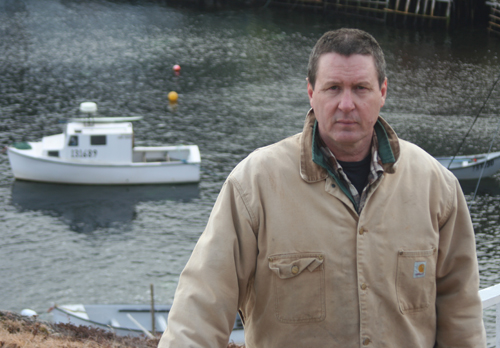
As a “come from away,” David Ward now lives in McCallum, an outport of fewer than 100 people on Newfoundland’s southern coast. There’s no road in or out. The closest centre is Hermitage, a relative metropolis at about 500 people that lies on a peninsula about 90 minutes away by ferry.
From his 700-square-foot house, Ward can see whales sounding in the Atlantic Ocean and bald eagles soaring over the granite cliffs rising 1,000 feet from the surf. Outside his door, so little topsoil stretches over the rock that he has to grow his vegetables in containers.
Who better to teach a U of G course in city gardens?
Formally, the distance education course is called “Ecology of Gardens and Landscapes in an Urban Environment.” Offered through the Office of Open Learning, it’s an elective in certificate programs in sustainable urban agriculture and horticulture.
Thirteen students are currently logging in for course assignments and discussion from locations in almost every province, as well as the eastern United States and even Greece. They’re learning how soil and water interact with plants, animals and people, and how to restore urban landscapes.
Linked online, the students and their instructor – a transplanted U of G grad and teacher – are a tossed salad. Among them are horticulturalists and urban gardeners, a city parks manager, an architect and the coach of Canada’s aboriginal snowboard team.
Karen Heisz, B.Sc. ’88, says distance learning suits her reflective nature better than the immediacy of the classroom. The U of G grad now teaches high school science and helps run the school environmental club, and is learning to grow food at home in Toronto.
Speaking of the online class, she says, “We are all trying to learn more so that we can make a difference in our own communities, whether through our jobs or through thoughtful planning and living in our daily lives.
“So many times over the years I have wished that I had been an Aggie, so that I could support myself and my family while caring for the land. The certificate program is allowing me to do just that. Who knows where it will lead?”
Sarah Pollock studied earth and atmospheric science at Guelph. After earning her undergraduate degree in 2008, she travelled in Europe and volunteered on farms.
“Each farm that I stayed at had wonderful organic gardens, and it was so satisfying being able to pick vegetables and make delicious food for every meal,” she says. “I am still very much a rookie when it comes to gardening, but I am learning new things every day by taking this course.”
She plans to study international development at Humber College this fall and will start a master’s in environmental science at the University of Toronto in 2012.
From home in London, Ont., Lynn Haslam likes entering classmates’ gardens across Canada and in the United States – virtually, at least – to find common ground. “I am taking this course for the sense of community with like-minded individuals,” she says.
Haslam has dug back into the history – and even prehistory – of her garden in a 1950s subdivision located “between the Sifton Bog and the Thames River on glacial rubble. As a gardener, any local information I can find helps to inform the choices I make in my alterations to the landscape.”
Another student is Janice Ife, a veteran Ottawa-area landscape designer who has taught in horticulture programs at Algonquin College and at U of G’s Kemptville Campus. Changes to Algonquin’s program have introduced such topics as green roofs and walls, urban farming and organic gardening.
“I had heard and read a bit about each, of course, but never delved seriously into the topics,” says Ife. “When I received an email from the University of Guelph regarding online courses being offered over the summer, it seemed like the perfect opportunity to learn a little more.”
Having moved from Ontario in 2009, course instructor Ward is still learning to garden on that Newfoundland granite. He’s growing native fir trees, getting rid of a lawn and tending those container vegetables. “My gardening challenges include keeping gulls out of my root crops.”
Ward completed a horticulture diploma in the Ontario Agricultural College in 1984. After working as an arborist in hometown Kitchener, he helped run the horticulture program offered by the forerunner of Open Learning for three years.
For most of his career, he’s been a teacher, including stints at Humber College and back in Guelph’s diploma program. He taught urban ecology at Fleming College’s campus in Lindsay, Ont., for 12 years.
Ward’s Guelph contact is Stephen Fleischauer, program development manager in horticulture, landscaping and turf programs in the Office of Open Learning.
Speaking of his longtime colleague, Fleischauer says, “He’s passionate about the landscape. We’re looking at the landscape to create a sense of community. How do we bring people together in an esthetically pleasing, sustainable landscape?
“That’s what we’re trying to do with these programs,” even if the instructor now hails from a tiny outport on the Atlantic.